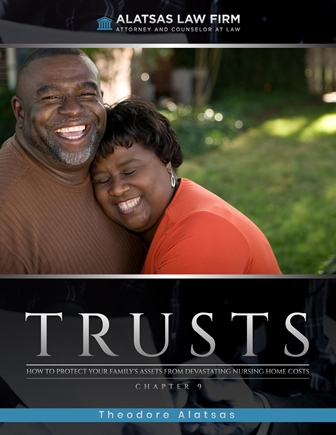
If your assets exceed Medicaid's income qualification rules but aren't sufficient to cover the cost of your long-term nursing care (or you want your assets to your designated beneficiaries), you may be tempted to transfer or gift your excess assets in order to qualify. Unfortunately, "uncompensated transfers" or "transfers without fair consideration" within Medicaid's five-year lookback period can trigger penalties that delay your eligibility for long-term care benefits.
Trusts, however, can serve as powerful Medicaid planning tools. At Alatsas Law Firm, we've helped countless clients utilize various trusts to protect their assets from the ravages of long-term care expenses.
Our Medicaid Planning Guide Has Information You Can Trust
Our experienced attorney wrote the book on Medicaid planning—literally. The guide, How to Protect Your Family's Assets From Devastating Nursing Home Costs, offers a wealth of helpful information on everything from how to apply for benefits to strategies to help you qualify.
In the chapter on trusts, which is available for free as a complimentary preview of our book, you can learn:
- What trusts are
- Important roles in a trust
- The difference between "trust property" and "trust income"
- How revocable and irrevocable trusts differ, and which is most beneficial for Medicaid planning
- How income-only trusts can help you pay for living expenses
- The benefits of using two revocable trusts
- Pooled trusts and reasons for using them
- And much, much more
Take Advantage of Our Free Offer Today
Don't wait until it's too late to start planning for your long-term care needs. Request the free chapter, Trusts, from our guide, How to Protect Your Family's Assets From Devastating Nursing Home Costs, now. Just complete the form below and we'll send you an email with a link to an instant download, then reach out to answer your questions and send you the full version of our book.
